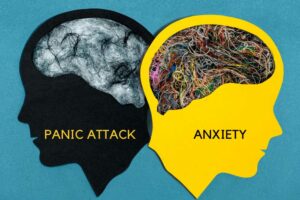If you look at the descriptions of addiction treatment centers, you will notice phrases like “comprehensive,” “client-centered,” or “treating the whole person.” This represents a welcome change from a number of years ago when drug and alcohol rehabilitation centers focused on helping the client achieve sobriety and commit to a substance-free life and then sent them on their way. Thankfully, there are centers now that recognize that in order for a person to sustain sobriety, the needs of the whole person must be addressed.
Addiction Is a Symptom
Frequently, substance abuse goes hand in hand with a mental health issue, which is called a dual diagnosis. According to The Journal of the American Medical Association, 29% of people who have been diagnosed with a mental illness also abuse alcohol or drugs. Frequently, people with mental health issues self-medicate with drugs or alcohol to relieve the painful emotions brought about by the underlying mental disorder. Of course, it can also be that substance abuse creates the symptoms of mental illness, or at least exacerbates them. Also, many people struggling with addiction have suffered trauma during their life. Some mental health professionals believe that trauma is one of the root causes of substance abuse. In order to address the underlying trauma or mental health issue underlying the addiction, some centers now are licensed to treat dual diagnosis and screen for this during the intake process.
Physical Problems of Substance Abuse
Substance abuse can cause health problems and those issues need to be addressed in recovery as well. Perhaps the most obvious health problem associated with substance abuse is overdose, which can be fatal. In general, different substances cause different health problems. For example, alcohol abuse can lead to weight gain in some people. Conversely, some people lose interest in food when they are drinking heavily, and so lose weight and become malnourished. In addition to weight gain or weight loss, which then leads to health problems, alcohol can cause liver and kidney damage, neuropathy, high blood pressure, gastrointestinal problems, and some types of cancer. Methamphetamines cause dental problems. Any drug that is smoked can cause lung cancer, emphysema, or chronic bronchitis. Any stimulant can cause heart disease, and any injectable drug can lead to infections, including HIV, and hepatitis C.
In recovery, the patient’s body and mind must heal. Detoxification, or detox, is frequently the first step in the process. Medically assisted detox is often recommended because withdrawal from some substances, like alcohol, can be fatal. Detoxing with medical assistance can keep the person in recovery safe and ease withdrawal symptoms. After that, therapy can begin.
In addition to therapy and counseling, many centers also stress the importance of good nutrition and exercise. When in the grip of an addiction, many people either don’t take in enough calories throughout the day or make poor food choices, frequently having diets high in processed food. Processed food contributes to metabolic syndrome and has been linked to anxiety and depression as well. Exercise is also an important part of recovery, both for the body and the mind. Regular exercise can help prevent heart disease, high blood pressure, type 2 diabetes, and arthritis. Aerobic exercise, like running, jogging, walking, cycling, and swimming, reduces anxiety, depression, and negative mood and can improve sleep and cognitive function.
Other Problems Stemming from Addiction
Addiction can cause a whole host of other challenges as well. Substance abuse can cause problems at work, leading to poor job performance, strained relationships with co-workers, and even job loss. Financial problems can also stem from addiction, as people struggling with substance abuse frequently spend an inordinate amount of money obtaining their substance of choice and can make poor financial decisions because of impaired cognitive function. Substance abuse can result in damaged relationships with friends and family. This can lead to loss of friendships, separation and divorce, and sometimes losing custody of children either to the other parent in divorce or to foster care. In addition, drug and alcohol abuse can lead to legal problems. Substance abuse can lead people to commit crime, either in using illegal substances, stealing to support his or her substance abuse, or driving under the influence.
Healing from a substance use disorder is more than repairing the person’s body and mind. Frequently, someone in recovery will need help with social issues, relationships with family and friends, reentering the workforce if job loss has occurred, and legal issues. A recovery program can teach the life skills necessary to deal with these issues. Recovery is more than healing the body and mind; it’s helping a person rebuild their life.
Promising Outlook, a drug and alcohol treatment center located in Riverside, California, teaches clients the life skills they need to repair their lives in the wake of a substance use disorder. In addition to healing the body and the mind, people in recovery may need help with work, family, social, and legal issues. Promising Outlook is a comprehensive rehabilitation center that focuses on treating the whole person, not merely his or her addiction challenges. An individualized treatment program is developed for each patient with the goal of addressing the possible trauma and mental health issues that frequently accompany substance abuse. Clinical treatment modalities offered include cognitive behavioral therapy (CBT), dialectical behavior therapy (DBT), mindfulness-based stress reduction, relapse prevention, motivational interviewing, and psychotherapy. Promising Outlook offers outpatient services to both men and women. If you or someone you know is seeking treatment for substance abuse in a compassionate and non-judgmental environment, call 866.980.2869.






